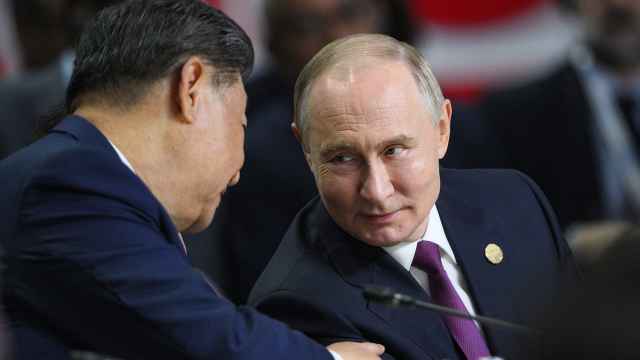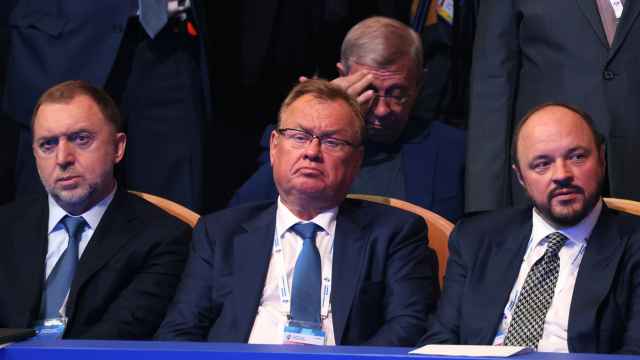Russian laws against homosexuality have a long history. Orthodox clerics condemned sex between men and youths. They also condemned men who shaved, used make-up, or wore gaudy clothing as devotees of the "sodomitical sin."
It was only with Peter the Great in the late 17th and early 18th centuries that Russia's first secular law against sex between men was adopted, in his Military Code of 1716. Relations between men in the army and navy were punished by flogging, and male rape, by penal servitude in the galleys.
Later in the 18th century it was proposed that this law be extended to civilians. This was not done, but new research by St. Petersburg historian Marianna Muraveva shows that church and military courts actively prosecuted sodomy cases.
In 1835, Tsar Nicholas I formally extended the ban on male same-sex relations to wider society in a new criminal code. He was supposedly motivated by reports of vice in the Empire's boarding schools. Men who engaged in voluntary "sodomy" (muzhelozhstvo) were exiled to Siberia; sodomy with minors or the use of force netted exile with hard labor. This law remained in force until 1917. There was no law against lesbian relations.
The authorities in tsarist Russia avoided enforcing the law against upper-class homosexuals. There was no major homosexual scandal in pre-1917 Russia to match those of Britain's Oscar Wilde, Austria-Hungary's Colonel Alfred Redl, or the German Prince Eulenberg. Powerful supporters of the Romanov dynasty, and members of the tsar's family, were flagrantly gay, and received patronage and immunity from the throne. Yet when the government drafted a new criminal code — never to be adopted — in 1903, it continued to criminalize male homosexuality.
When revolution came in 1917, the Provisional Government wanted to enact the 1903 criminal code, but lost power to the Bolsheviks, who abrogated all tsarist law in November 1917. Until 1922 there was no written criminal law.
During this interval successive codes were drafted and discarded. All of these drafts, beginning with the first written in early 1918 by the Bolsheviks' coalition partners, the Left Socialist Revolutionaries, and continuing with versions drafted in 1920-21 by Bolshevik jurists and a consultant from the Cheka, decriminalized homosexuality. The first Soviet criminal code of 1922 and the revision of this code in 1926 both confirmed the legality of voluntary same-sex relations.
Modern Russia's homophobia can trace its roots from the rise of Stalin and his henchmen. In September 1933, deputy chief of the secret police Genrikh Yagoda proposed to Stalin that a law against "pederasty" was needed urgently.
Police raids had been conducted on circles of "pederasts" in Moscow and Leningrad. They were supposed to be guilty of spying; they had also "politically demoralized various social layers of young men, including young workers, and even attempted to penetrate the army and navy."
Stalin forwarded Yagoda's letter to Lazar Kaganovich, noting "these scoundrels must receive exemplary punishment" and directing that a law against "pederasty" be adopted. The new law was adopted for all the Soviet republics in March 1934, with a minimum sentence of three to five years for consenting male homosexuality.
Harry Whyte, a British Communist working for the English-language Moscow Daily News wrote to Stalin in May 1934, asking him to justify the new law. He boldly explained why it violated Marxist principles. He asked Stalin, "Can a homosexual be considered a person fit to become a member of the Communist Party?" Stalin scrawled across the letter, "An idiot and a degenerate. To the archives."
The anti-homosexual law remained in place until 1993 in Russia. Without access to FSB and presidential archives we have only a rough idea of how many men were prosecuted under it; at minimum, tens of thousands suffered.
De-Stalinization under Nikita Khrushchev actually cemented the law in place. In 1958 the Interior Ministry issued a secret decree "on the strengthening of the struggle against sodomy," telling police to enforce the law with renewed vigor. From this date about 1,000 men were imprisoned annually in the Soviet Union for their homosexuality. Soviet authorities worried that the millions of men released from the single-sex Gulag camps were a source of "sexual perversion" dangerous to Soviet society.
Discussions during the Perestroika years seemed to point toward reform, but the Interior Ministry fought vigorously against any relaxation. In April 1993, as part of a package to bring Russian legislation in line with Council of Europe standards, the Yeltsin administration decriminalized male homosexuality, but there was no amnesty for the hundreds of men still in prison under the law at that time.
In 2002, during a Duma debate about changes to sex-crime legislation, nationalist-conservative deputies called for the re-criminalization of voluntary sodomy and for the first time in a millennium of Russian legal history, the criminalization of lesbian acts. The Kremlin ignored these calls, but the status of Russia's lesbians and gays remains an open question. Like Harry Whyte in 1934, we might well ask, "Can a homosexual be considered a person fit to be a citizen of the Russian Federation?"
***Dan Healey is a professor of modern history at Reading University and author of Homosexual Desire in Revolutionary Russia: The Regulation of Sexual and Gender Dissent (Chicago: U of Chicago Press, 2001). A revised and expanded Russian edition is available: Gomoseksual'noe vlechenie v revoliutsionnoi Rossii (Moscow: Ladomir, 2008).***
A Message from The Moscow Times:
Dear readers,
We are facing unprecedented challenges. Russia's Prosecutor General's Office has designated The Moscow Times as an "undesirable" organization, criminalizing our work and putting our staff at risk of prosecution. This follows our earlier unjust labeling as a "foreign agent."
These actions are direct attempts to silence independent journalism in Russia. The authorities claim our work "discredits the decisions of the Russian leadership." We see things differently: we strive to provide accurate, unbiased reporting on Russia.
We, the journalists of The Moscow Times, refuse to be silenced. But to continue our work, we need your help.
Your support, no matter how small, makes a world of difference. If you can, please support us monthly starting from just $2. It's quick to set up, and every contribution makes a significant impact.
By supporting The Moscow Times, you're defending open, independent journalism in the face of repression. Thank you for standing with us.
Remind me later.





